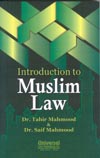Introduction to Muslim Law

Introduction to Muslim Law
Tahir Mahmood & Saif Mahmood
Universal Law Publishing Co. Pvt. Ltd. 2013
This is an abridged edition of the book Muslim Law in India and Abroad launched in March 2012. Chapters have been rearranged, long texts of Indian and foreign legislative enactments omitted, and judicial decisions reported during 2012 added, in this edition.
Modern India has a double family law regime. All religious groups in the country have community-specific personal laws applicable to them. Unlike the personal laws of the other communities Muslim law is largely uncodified. There are only some brief Acts regulating its scope and application, women’s divorce and post-divorce rights, and religious endowments and pilgrimage. Giving them priority, Part I of this book offers a study of all these Acts along with relevant case law.
Principles of traditional Muslim law are applicable in India subject to the contrary provisions of some general Indian laws; and the courts in this country have interpreted these principles in their own way. Part II of the book offers a modern exposition of the traditional law in the light of the restrictive Acts and case law of this country.
Popular textbooks on the subject cite and rely on innumerable outdated court decisions running contrary to the present-day understanding of Muslim law. Ignoring them, this book refers only to recent judicial rulings conducive to modern social conditions, and cites old cases only where necessary to comprehend the background of some law.
In numerous countries abroad Muslim law has been subjected to codification and reform by the State. A brief on such laws will be found in the Appendix to this book. This will help our readers to see how widely is India lagging behind in this regard.